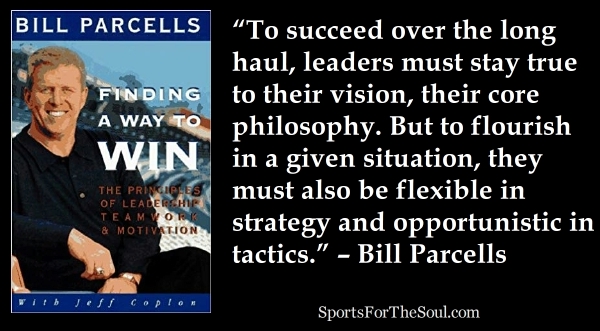 In last week’s column, I wrote about Bill Parcells and his advice that “newer isn’t always better.” He warned against the tendency to constantly chase after whatever is new and trendy.
In last week’s column, I wrote about Bill Parcells and his advice that “newer isn’t always better.” He warned against the tendency to constantly chase after whatever is new and trendy.
Parcells also pointed out that ego can sometimes drive one’s (unnecessary) desire to change. Changing things up simply to make yourself look smarter is usually a recipe for failure. “Winners don’t need to be recognized as brilliant,” Parcells said. “They strive to be dominant.”
Bill Parcells’ point was clear: mastering the fundamentals and keeping your strategy as simple as possible are two keys to success.
Because of this philosophy, some people assume that Parcells was a stubborn, rigid, my-way-or-the-highway type of coach who refused to be flexible. They think he was the type of egotistical coach who would never admit he was wrong or that someone else had a better idea than him.
However, such characterizations of one of the greatest coaches in the history of the NFL would be wrong. Very wrong.
Though Parcells built his teams on the core philosophy he believed in—and he demanded discipline in implementing that philosophy—he was more than willing to adapt his strategies to other people’s ideas when necessary…
To succeed over the long haul, leaders must stay true to their vision, their core philosophy. But to flourish in a given situation, they must also be flexible in strategy and opportunistic in tactics.
That was my challenge with Lawrence Taylor, the greatest player I’ve ever coached—and the least predictable.
In the sixth game of Taylor’s career, against St. Louis, we call a defense in which the right outside linebacker drops back into pass coverage. Lawrence has a different idea; he decides to rush the quarterback. He sacks the quarterback, causes a fumble. We recover and eventually score a touchdown.
As he trots back to the sideline, I say, “Lawrence, did you know you were supposed to drop back in that defense?”
“Oh, yeah,” he replies. From the start, this guy was highly coachable. He sincerely wanted to learn.
I tell him, “This situation is going to come up again—are you sure you have it?”
“Oh, yeah, Coach, I got it.”
Sure enough, we call the same defense one quarter later. What does Lawrence do? He rushes. Not only does he sack the quarterback and force another fumble, but this time George Martin, our defensive captain, scoops the ball up and runs it in for a touchdown.
With the crowd in delirium, Lawrence comes back to the sideline. I just look at him, not saying a word—and then I see him slap himself in the head. “I did it again, didn’t I?” he says.
“Yeah, you did,” I tell him, doing my best to sound stern. “You know, Lawrence, we don’t even have what you just did. It isn’t in our playbook.”
“Well, Coach,” he says, “we better put it in on Monday, because it’s a dandy.”
And put it in we did. Our defense now had a new wrinkle—thanks to Taylor’s bold stroke and our willingness to use it.
– Bill Parcells, from his book Finding a Way to Win
Just as changing things up simply to look brilliant is asking for trouble, refusing to adapt simply because something wasn’t your idea is also a huge mistake.
In both cases, you need to set your ego aside and be humble enough to recognize that there is a better way—regardless of whether you’re the one who discovered it.
All great leaders are humble enough to be flexible. They recognize when what they’ve been doing no longer works or they see that a better, more efficient way discovered by someone else needs to be implemented.
While you must stick to your overall vision, you also must be open to change when necessary. Getting so stuck in your ways and refusing to budge simply because someone else discovered a better way is a path to failure.
Have the humility to admit when you’re wrong, when someone else has a better plan, or when it’s simply time to make a change.
As North Carolina basketball coach Roy Williams says, “Coaching is about adjustments. Your game plan is only good for the first six minutes—the rest is all about adjustments.”
Life is also about adjustments.
Those who refuse to be humble and flexible are those who refuse to be victorious.







